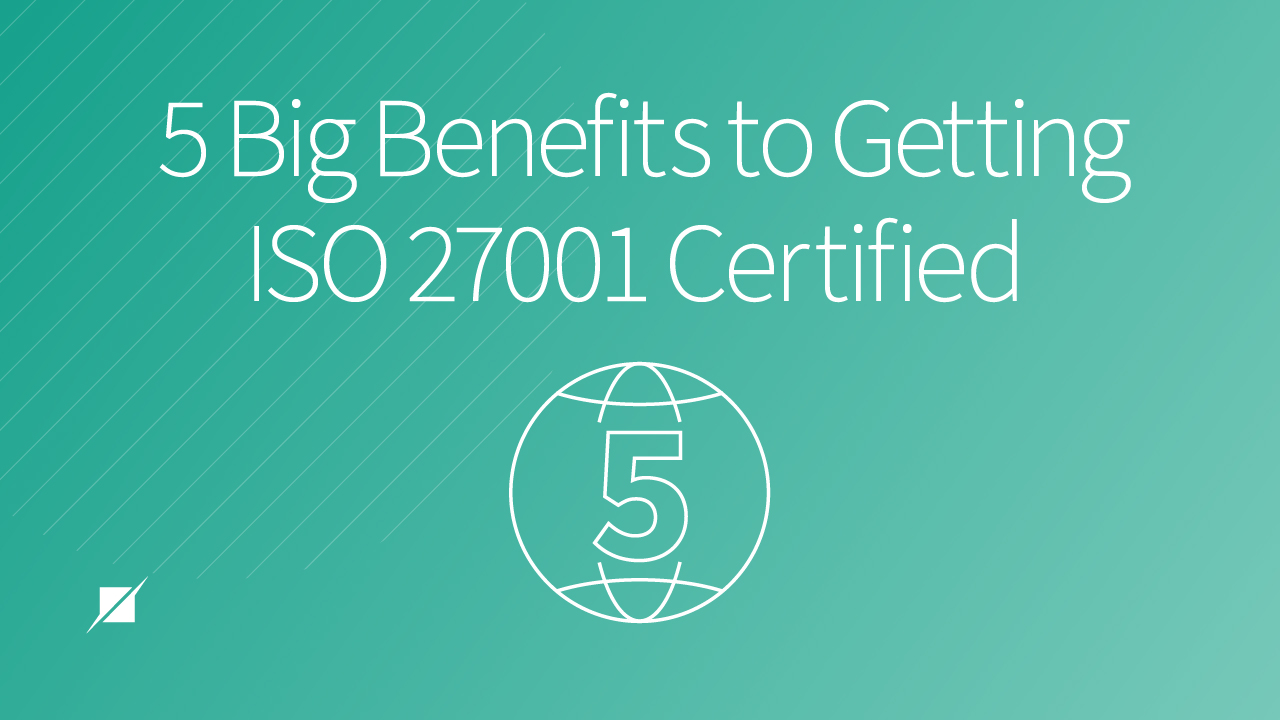5 of the Biggest Benefits of ISO 27001 Certifications
For the hiking enthusiast, Colorado has a lot to offer–lots of peaks to climb of varying heights to suit athletes with different skill sets.
You can explore the mostly level Garden of the Gods and there are obviously plenty of mountains, though it’s up to you whether you want to make the trek all the way up one of the famous Fourteeners–14,000 feet above sea level.
Compliance too has a lot to offer, and in some ways, an ISO 27001 certification symbolizes its own kind of Fourteener–they take a heck of an effort, but they’re also a real feather in your cap.
Sure, implementing what’s necessary to satisfy it will take a lot because the framework is so comprehensive. We can actually see you now–looking up at the summit of ISO 27001, grimacing.
But as much labor as it might be, the euphoria of having successfully climbed a big mountain is unique, and the same can be said for ISO 27001–in fact, it’s even better.
As an ISO Certification Body that has performed over 400 of these just in the last twelve months, we have seen many clients hesitate before implementing the requisite information security management system (ISMS) in order to become certified. But each of those times we’ve also had the inside track to witness the rewards that this effort spent yields. And whether we’re working with you or not, we want you to understand what we know to be true.
Becoming ISO 27001 certified is worth it for what it’ll give to your customers and what it’ll give to you too.
To help inform your decision, we’re going to explain more of the why. You will learn how to understand the five big advantages (and more) that this certification can provide your organization within your market. Afterwards, any reservations you have about commitment will be resolved because you’ll fully understand the success awaiting you at the summit of this “mountain.”
5 Benefits to Getting an ISO 27001 Certification
1. You’ll Be in Position to Strongly Reassure Your Customers That You’re Protecting Their Interests
This is clearly the number one reason anyone goes through any compliance endeavor, but for an ISO 27001 certification, this is particularly true. Why? Because of the holistic nature we mentioned before–the one that can seem daunting from the outside.
As intimidating as it may seem, the implementation of an effective ISO 27001 ISMS–based upon the documented selection of controls–will demonstrate to your customers that you have taken steps to protect the confidentiality, integrity, and availability of data, whatever the format and across the board.
You’ll demonstrate that because:
- You will have taken a systematic approach to information security using a selection of mitigating controls that will include a collection of processes, technology, and people to help identify, treat, and manage potential information security risks to your organization.
- Your job won’t be not “done” once you have established your ISMS and have been through the initial certification. As part of required ongoing maintenance and continual improvement, you will also be expected to evaluate the effectiveness of your ISMS on at least an annual basis, conduct internal audits to help ensure you continue to meet the requirements of the ISO 27001 standard, and report on the results of the ISMS to top management.
Such an effective risk management program with routine vigilance can help you prevent your customer’s information from getting into unauthorized hands. By going through the ISO 27001 certification process, you will have assessed the risks for a potential breach and mitigated any potential impact. Knowing you’ve gone to this kind of effort will keep your customers comfortable with you, encourage them to retain you, and it may even improve the business relationship between you.
2. You’ll Entice New Business Whilst Sharpening Your Competitive Edge
But not only will your ISO 27001 certification help you demonstrate your solidified security practices to those you already serve, it will also provide a proven marketing edge when put up against your competitors who may have opted for another compliance direction, if any at all.
Notable organizations like Google, Microsoft, and Amazon can all say they’ve been certified, and they’re doing “pretty well.” Putting yourself in their company helps prove to anyone looking for your kind of vendor that you’re very serious about preventing data breaches and protecting their information–that’s a significant checkmark in your favor that will only enhance your reputation.
3. You’ll Be in Better Position to Avoid the Financial Penalties and Losses Associated with Said Data Breaches
You’ve seen them in the news, these breaches and the devastating fallout for those organizations. These days, the average cost of a data breach globally has grown to almost $4 million (that’s according to Ponemon Institute).
Very few have that cash to spare, and even less want to spend it mitigating damages like that. As part of the establishment, implementation, and maintenance of your ISO 27001 certification, you will be required to identify potential threats and vulnerabilities to the scope of your ISMS to help establish a documented set of controls to mitigate and reduce the associated risk.
Of note: Becoming ISO 27001 certified is not a guarantee that you’ll never have a breach. But with the robust system that it mandates you have in place, risks, disruption, and costs can be minimized.
4. You’ll Satisfy Different Business, Legal, and Regulatory Requirements
Every organization is different and therefore beholden to different regulations, but everyone loves to kill two birds with one stone, right?
With the way it is designed, becoming ISO 27001 certified will ensure the selection of adequate and proportionate security controls that will also help in satisfying other requirements such as the Sarbanes–Oxley Act (SOX), NIST CSF (Cybersecurity Framework), and the General Data Protection Regulation (GDPR) of the European Union–some of which will levy costly fines for non-compliance.
5. You’ll Have the Framework in Place to Suit Other Compliance Possibilities
For a while, SOC 2 was the standard most first-timers took with their compliance, but these days ISO 27001 is up there too for organizations laying groundwork.
Unlike more specialized frameworks like the aforementioned GDPR or HIPAA, ISO 27001 encompasses all kinds of confidential and sensitive data, as well as many types of information storage. That breadth of coverage means that if you’re ISO 27001 compliant, you likely have implemented the kinds of security measures and processes that will also satisfy other standards in the event you need another audit.
(At the very least, you’ll be in a much better position to just do some tweaking of elements, rather than wholesale changes.)
Other Benefits to Becoming ISO 27001 Certified
- It bolsters your internal security structure and will streamline on-boarding.
- As an organization grows, it’s easy for confusion regarding security to take root. Because the ISO 27001 standard requires you to clearly document information risk responsibilities, it makes it easier for your staff–both old and new–to understand their roles and what is expected of them.
- Plus, an effective ISMS requires buy-in from top management. With that support from up high, your organization will more easily align information security objectives with overarching business goals and objectives.
- It reduces the need for many different audits.
- Your ISO 27001 certification will indicate a globally accepted level of security effectiveness, which will satisfy a breadth of customer requirements and audits that will save you time and money.
- It will help you sleep easier at night.
- An ISO 27001 certification means you’ll have an independent opinion about your security and risk posture, and the nature of the review process means your auditor will be making regular evaluations to ensure that your ISMS both functions successfully and is being continually improved.
Choosing to Become ISO 27001 Certified
There’s clearly a lot to be said for a standard like this. You’ll protect and enhance your reputation within your market while reassuring your customers that you’re a strong steward for their information. Not only that, but you’ll also strengthen your internal security workings and put yourself in an ideal position to expand your compliance portfolio–all through one certification.
Of course, to get all that you’ll have to take that systemic approach to your data protection and implement a stout ISMS that’ll satisfy the extent of the ISO 27001 requirements. But you know now that the effort will be well worth the reward.
As you now gear up in your preparation, our team is available to answer any questions you have on the particulars of ISO 27001 as it concerns your organization. In the meantime, read these articles to ensure you’re as prepared as possible for your upcoming climb up the mountain.
About JORDAN HICKS
Jordan Hicks is the Manager of Content at Schellman. As the owner of content marketing initiatives across all digital platforms and formats, she is responsible for the ideation of content, the authoring and development of the content, as well as developing and managing the editorial calendar to ensure the marketing goals are met as it relates to content.




